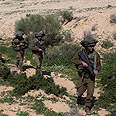
"The corps is half as big as it was 30 years ago," Sheffer said, adding that some 70% of approximately 700,000 IDF soldiers are reservists. "We have only 3-5% of professional soldiers in the IDF, which is very low compared to other nations' militaries."
Related stories:
- Budget transfers to Defense Ministry frozen
- US to invest additional $400 million in Iron Dome
- Lapid: 2014 budget deficit to rise to 3%
"There are fewer soldiers and we feel it in daily practices. For example, the cyber unit is understaffed, as is the unit that operates the Iron Dome. The trend will only escalate," said the official.
Sheffer added that the IDF no longer has the budget to operate an army of the size it had in earlier decades, suggesting streamlining – reducing the number of personnel in order to boost its effectiveness – as the solution.
Regarding the expected cut in the defense budget, Sheffer noted that military budget is, by nature, not flexible and cannot be changed from year to year. "It is not feasible for us to plan only one year ahead. You cannot run the military with a 12 month budget – only a long term one. What such cuts will immediately affect is military operations – not structure or wages."
With respect to the alleged weakening of the regular armies of the neighboring Arab states, Sheffer said that "Syria's collapse doesn't mean we can allow a weakening of the IDF's military capabilities. We can't allow for a long military campaign that includes enemy firing at the home front."
"Syria poses challenges the likes of which we haven't met for 40 years," he continued. "Today it's more expensive to run an armored division than it was a decade ago. Also, it's much more complex to hit a Scud launcher than it is to operate a MiG aircraft."
- Receive Ynetnews updates
directly to your desktop















